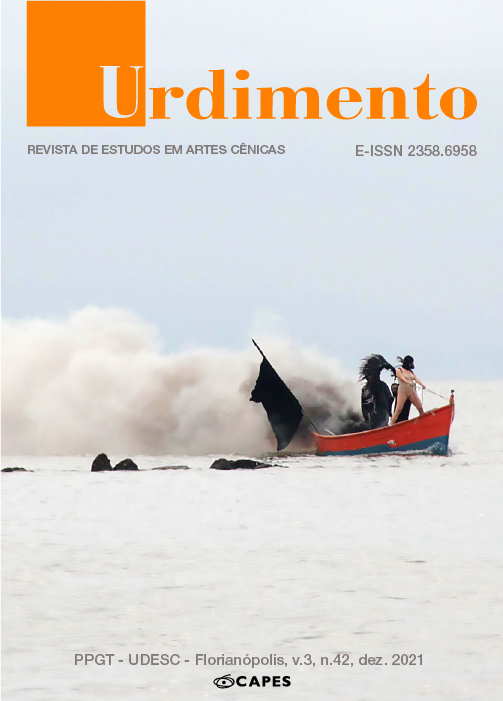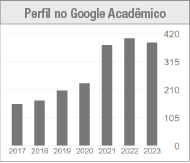A reappraised tragedy: Lazzaro, by Francisco Pereira da Silva
DOI:
https://doi.org/10.5965/1414573103422021e0211Keywords:
Francisco Pereira da Silva, Tragedy, Intermezzo, New TestamentAbstract
This article approaches the play Lazzaro (1948), one of the first works by playwright Francisco Pereira da Silva, born in Piaui, Brazil, in which he uses the genre intermezzo interlaid in an essentially tragic work, in order to discuss its dramatic function in it. The play here analyzed presents many connections with the tragedy Electra in the versions of both Sophocles and Euripides. But while in the Greek plays Orestes is not an instrument of blind fate since he acts as his father’s conscious avenger and his sister’s protector, in Pereira da Silva’s work the text is a little more complex because it is mixed with other texts, be it with different Greek myths or other textual inspirations such as the New Testament. It suffices to pay attention to the character’s given name that is also the title of the play. Besides, in the Brazilian playwright’s work we find the transposition of the original myth to the home of a decaying family in Northeastern Brazil.
Downloads
References
BAKHTIN, Mikhail. A cultura popular na Idade Média e no Renascimento: O contexto de François Rabelais. São Paulo-Brasília, Hucitec, 2008.
BARBOSA, Francisco de Assis. “Romance, teatro e regionalismo”. In: SILVA, Francisco Pereira da. Teatro completo. Organização Virgílio Costa. Rio de Janeiro: Funarte, 2009, Vol. I, II e III.
BODNAR, Roseli. Entremez: jogos de espelho em um labirinto sem fim - A dramaturgia de Ariano Suassuna, Francisco Pereira da Silva e Hermilo Borba Filho.2017.367f. Tese (Doutorado em Letras) – Pontifícia Universidade Católica do Rio Grande do Sul, Programa de Pós-Graduação em Letras, Porto Alegre, 2017.
BÍBLIA DE JERUSALÉM. Vários tradutores. São Paulo: Paulus, 2008.
BORBA FILHO, Hermilo. Teatro selecionado. Leda Alves; Luís Augusto Reis (Org.) Rio de Janeiro: Funarte, 2007, Vol. I, II e III.
COSTA, Virgílio. “Nota inicial do organizador”. In: SILVA, Francisco Pereira da. Teatro completo. Organização Virgílio Costa. Rio de Janeiro: Funarte, 2009, Vol. I, II e III.
DOMINGOS, Ana Cláudia Munari et HOHLFELDT, Antonio – “Seduzindo o leitor: os títulos das obras de Lygia Fagundes Telles” in RESENDE, Nilton e BUENO-RIBEIRO, Eliana (org.) – Pelo sonho é que vamos. Dossiê Lygia Fagundes Telles, Arapiraca, Editora da Universidade Estadual de Alagoas. 2020, edição digital.
FERREIRA, Juca. “Apresentação”. In: SILVA, Francisco Pereira da. Teatro completo. Organização Virgílio Costa. Rio de Janeiro: Funarte, 2009, Vol. I, II e III.
HELIODORA, Bárbara. “Um autor brasileiro”. In: SILVA, Francisco Pereira da. Teatro completo. Organização Virgílio Costa. Rio de Janeiro: Funarte, 2009, Vol. I, II e III.
GUIMARÃES, Rute. Dicionário da mitologia grega. São Paulo: Cultrix, 1974.
GRIMAL, Pierre. A mitologia grega. Lisboa: Europa-America, s/d.
MANBERTI, Sérgio. “Francisco Pereira da Silva”. In: SILVA, Francisco Pereira da. Teatro completo. Organização Virgílio Costa. Rio de Janeiro: Funarte, 2009, Vol. I, II e III.
RYNGAERT, Jean-Pierre. Introdução à análise do teatro. São Paulo: Martins Fontes, 1996.
RODRIGUES, Nelson. Senhora dos afogados. Rio do Janeiro: Nova Fronteira, 2004.
SILVA, Francisco Pereira da. Teatro completo. Organização Virgílio Costa. Rio de Janeiro: Funarte, 2009, Vol. I, II e III.
Downloads
Published
How to Cite
Issue
Section
License
Copyright (c) 2021 Urdimento - Revista de Estudos em Artes Cênicas

This work is licensed under a Creative Commons Attribution 4.0 International License.
Copyright Statement
The articles published by the magazine are free to use. The copyright is all assigned to the magazine. The articles whose authors are identified represent the expression from the point of view of their authors and not the official position of the journal Urdimento. The author (s) undertakes whenever publishing material relating to the article published in Revista Urdimento mention the said publication as follows: This article was originally published by Urdimento magazine in its volume (put the volume), number (put the number) in the year of (put the year) and can be accessed at:
http://www.revistas.udesc.br/index.php/urdimento
This work is licensed under a Creative Commons Attribution 4.0 International License.




